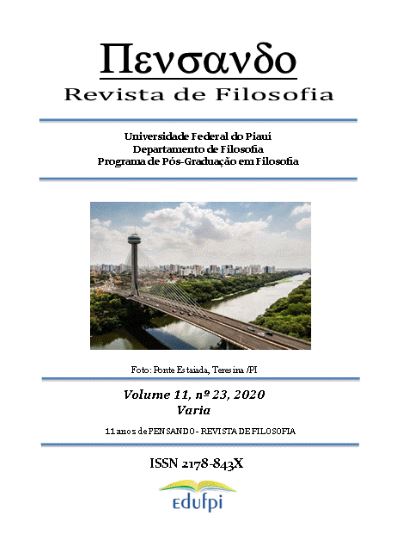LA CULTURA COMO ANDAMIO DE LA AGENCIA HUMANA
DOI:
https://doi.org/10.26694/pensando.v11i23.11057Palavras-chave:
Cultura, Cultura material, Enactivismo, Agencia, Mente extendida, Filosofía de la tecnologíaResumo
Se presenta un argumento en favor del papel activo de la cultura en el desarrollo de las capacidades agentes de los seres humanos. Esto se hace a través de una revisión del concepto tradicional de cultura, haciendo referencia a las críticas de algunos antropólogos de no concederle al entorno técnico material un papel central para el mantenimiento y la durabilidad de las prácticas culturales. Para el argumento se utilizan las ideas de la cognición extendida, embebida, extendida y enactiva (4E) con el fin de justificar por qué la agencia humana no es simple acción causal, sino que está relacionada con la experiencia de logro y libertad. Creemos que esto se debe, en parte, a que está apoyada en un entorno enriquecido de andamios culturales. En este sentido, la cultura se puede entender como un «nicho ecológico» en el cual los grupos humanos desarrollamos nuestras prácticas y capacidades más distintivas.
Referências
ANSCOMBE, Gertrude Elizabeth Margaret. Intention. London: Harvard University Press, 1957.
BOYD, Robert, y Peter RICHERSON. Culture and the Evolutionary Process. Chicago: The University of Chicago Press, 1985.
BRONCANO, Fernando. «Consideraciones epistemológicas acerca del «sentido de agencia».» Logos. Anales del Seminario de Metafísica 39 (2006): 7-27.
—. Entre ingenieros y ciudadanos: filosofía de la técnica para días de democracia. Madrid: Montesinos Ensayo, 2006.
BRONCANO, Fernando. «La agencia técnica.» Revista CTS, 2005: 95-105.
—. La estrategia del simbionte. Cultural material para nuevas humanidades. Salamanca: Delirio, 2012.
—. La melancolía del ciborg. Barcelona: Herder, 2009.
BUZNEY, Catherine, y Jon MARCOUX. Cultural Materialism. 2009. http://anthropology.ua.edu/cultures/cultures.php?culture=Cultural%20Materialism (último acceso: Febrero de 2013).
CLARK, Andy. Being There: Putting Brain, Body and World Together Again . London: The MIT Press, 1997.
—. Natural-Born Ciborgs. Minds, Technologies and the Future of Human Intelligence. Oxford: Oxford University Press, 2003.
CLARK, Andy, y David J CHALMERS. «The Extended Mind.» Analysis, nº 58 (1998): 10-23.
D'ANDRADE, Roy. The development of cogntive anthropology. Cambridge: Cambridge University Press, 1995.
DAVIDSON, Donald. «Actions, Reasons, and Causes.» En Essays on Actions and Events, de Donald Davidson, 3-20. Oxford: Clarenton Press, 1980.
DAWKINS, Richard. The Selfish Gene. London: Oxford University Press, 1976.
GEERTZ, Clifford James. The Interpretation of Cultures: Selected Essays. New York: Basic Books, 1973.
HARRIS, Marvin. The Rise of Anthropological Theory. A History of Theories of Culture. New York: Thomas Y. Crowell Company, 1968.
INGOLD, Tim. The Perception of the Environment. Essays on livelihood, dwelling and skill. London: Routledge, 2000.
KROEBER, A L, Clyde KLUCKHOHN, y Wayner UNTEREINER. Culture: A Critical Review of Concepts and Definitions. New York: Vintage Books, 1957.
LATOUR, Bruno. Reassembling the Social. An Introduction to Actor-Network-Theory. Oxford: Oxford University Press, 2005.
LAWLER, Diego. «Los estándares como artefactos.» Unisinos Journal of Philosophy 21, nº 1 (2020): 24-35.
MERLEAU-PONTY, Maurice. Phenomenology of Perception. London: Routledge, 1962.
MONTERROZA RIOS, Alvaro David. La naturaleza heterogénea de los artefactos. Un análisis ontológico. Medellín: Fondo Editorial ITM, 2018.
—. «Una revisión crítica a la teoría del actor-red para el estudio de los artefactos.» Trilogía Ciencia Tecnología y Sociedad 9, nº 17 (2017): 49-62.
OLSEN, Bjørnar. «Material Culture after Text: Re-Membering Things.» Norwegian Archaeological Review 36, nº 2 (2003): 87-104.
PRINZ, Jesse. «Culture and Cognitive Science.» The Stanford Encyclopedia of Philosophy. 2011. http://plato.stanford.edu/archives/win2011/entries/culture-cogsci/ (último acceso: 12 de Febrero de 2013).
SCHIFFER, Michael Brian. The Material Life of Human Beings. Artifacts, behavior and communication. New York: Routledge, 1999.
SCHLOSSER, Markus. «Agency.» Vers. Fall 2015. The Stanford Encyclopedia of Philosophy. 2015. http://plato.stanford.edu/archives/fall2015/entries/agency.
SCUPIN, Raymond. Cultural anthropology: A global perspective. Prentice Hall, 2012.
SEARLE, John Rogers. Intentionality: An Essay in the Philosophy of Mind. Cambridge: Cambridge University Press, 1983.
SOBREVILLA, David. «Idea e historia de la filosofía de la cultura.» En Filosofía de la Cultura, de David Sobrevilla, 11-36. Madrid: Trotta, 1998.
SPERBER, Dan. Explaining culture: a naturalistic approach. Oxford: Blackwell, 1998.
STERELNY, Kim. «Minds: extended of scaffolded.» Phenomenology and the Cognitive Sciences, 2010: 465–481 .
VARELA, Francisco Javier, Eleanor ROSCH, y Evan THOMPSON. The Embodied Mind. Cognitive Science and Human Experience. Cambridge, MA: The MIT Press, 1991.
WILSON, Robert A, y Lucia FOGLIA. «Embodied Cognition.» Vers. Spring 2017. The Stanford Encyclopedia of Philosophy. Editado por Edward N Zalta. 2017. https://plato.stanford.edu/archives/spr2017/entries/embodied-cognition (último acceso: 26 de june de 2020).
WITTGENSTEIN, Ludwig. Investigaciones filosóficas. Traducido por Alfonso García Suárez y Ulises Moulines. Barcelona: Crítica, 1988.

























